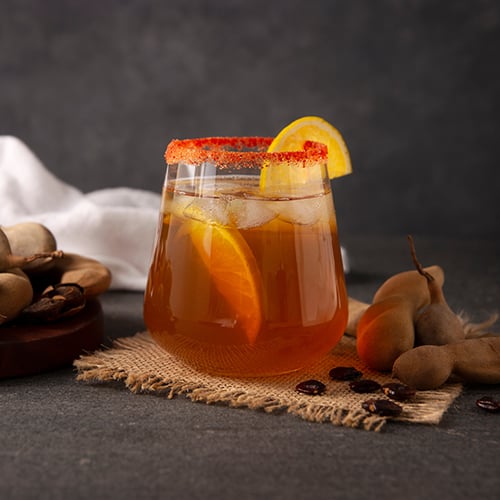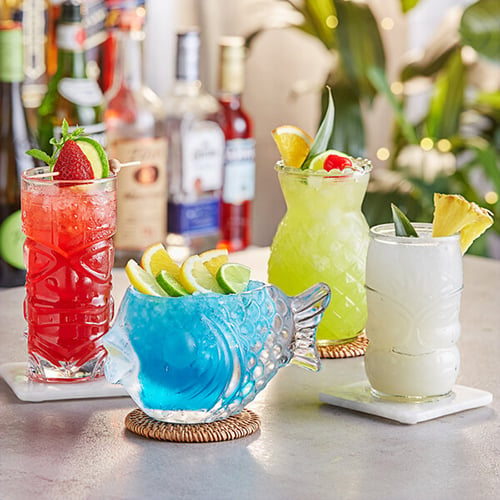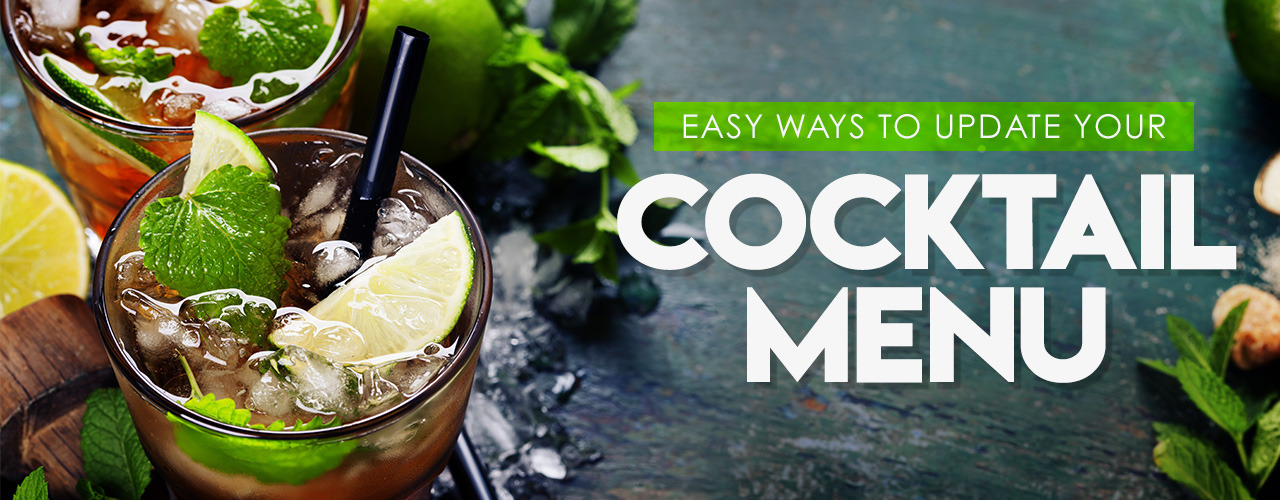In the ever-evolving world of cocktails, keeping your menu fresh and exciting is key to attracting customers. By incorporating new flavors, techniques, and the latest bar trends, you can revamp your cocktail menu to appeal to a wider audience and create a memorable experience for your patrons. If you’re looking for a few easy updates, try incorporating the suggestions below into your drink menu.
How to Update Your Cocktail Menu
Move beyond well drinks and make your drink menu shine by incorporating simple updates that will set your bar apart from the competition. We’ve created a list of some menu updates you can try for your business:
1. Use Unique Ingredients

When updating your cocktail menu, incorporating unique ingredients can catch the eye of your patrons and attract adventurous customers. Experimenting with unique flavors as cocktail garnishes or recipe components allows you to create signature drinks that showcase your bar's creativity and innovation.
- Yuzu: A citrus fruit native to East Asia, yuzu is known for its aromatic and tangy flavor profile. Its juice and zest can add a refreshing citrus kick to cocktails, making it a popular choice for mixologists looking to elevate their creations.
- Tamarind: Tamarind is a tropical fruit widely used in culinary applications for its sweet and sour taste. Its pulp or concentrate can be incorporated into cocktail recipes to add a unique depth of flavor that pairs well with spirits like rum and tequila.
- Chamoy: Add a bold a Mexican condiment to your drinks. Chamoy is made from pickled fruit, typically apricot or plum, seasoned with chili peppers and lime. Its sweet, spicy, and tangy flavor profile can bring a bold and zesty twist to the rim of margaritas, micheladas, or palomas, adding a touch of Mexican flair.
- Lychee: With a sweet and floral taste, lychee is a tropical fruit that can lend a delicate, exotic flavor to cocktails. Whether used in the form of syrup, puree, or liqueur, lychee can enhance the aroma and sweetness of beverages, offering a refreshing and sophisticated twist to traditional recipes like mojitos and mai tais.
- Tajin: Tajin is a Mexican seasoning blend made from chili peppers, lime, and salt, offering a spicy, tangy, and savory flavor profile. Using Tajin as a cocktail rim garnish or ingredient can elevate margaritas, mules, and ranch water with a bold and distinctive taste that tantalizes the palate.
2. Incorporate Unique Spirits

Most drinks can be crafted with traditional spirits like vodka, rum, and tequila, but you can provide a memorable experience with unique spirits that will have your customers coming back for more.
- Limoncello: Add a refreshing twist to your cocktail menu by incorporating limoncello, a lemon-flavored Italian liqueur. Its bright citrus notes can enhance a variety of cocktails, such as a limoncello spritz or limoncello lemon drop, adding a zesty and vibrant flavor profile.
- Non-Alcoholic Spirits: Cater to a growing demand for non-alcoholic options by including non-alcoholic spirits in your cocktail menu. These alternatives provide the complexity and depth of traditional spirits without the alcohol content, allowing you to create sophisticated and flavorful mocktails for your customers.
- Aperitifs: Enhance the pre-dinner experience by featuring a selection of aperitifs, such as vermouth or Aperol, on your cocktail menu. These light and dry spirits stimulate the appetite and set the stage for a delightful dining experience.
- Digestifs: Conclude the dining experience on a high note by offering a selection of digestifs, like Amaro or Campari. These post-meal spirits aid digestion and provide a satisfying end to a delicious meal.
- Mezcal: Explore the smoky and earthy flavors of mezcal to add depth and complexity to your cocktail menu. This Mexican spirit is gaining popularity for its distinct taste and can be used to make mezcal margaritas or mezcal-based variations of classic drinks.
- Cachaca: Offer your customers a taste of Brazil by incorporating cachaca into your cocktail menu. This sugarcane spirit is the key ingredient in the traditional Brazilian cocktail, the caipirinha, and can also be used in other drinks to add a unique tropical flair to your offerings.
3. Craft Savory Cocktails

Taking the savory route allows mixologists to balance flavors similar to how a chef creates a plate of food. While this isn’t necessarily a new concept (think of a spicy Bloody Mary and salt-rimmed margarita), bartenders are finding new and creative ways to play with savory flavors.
- Herbs and Spices: Elevate your cocktail menu by infusing unique flavors using herbs and spices, such as black pepper, fresh thyme, rosemary syrup, and chili. These ingredients add depth and complexity to your drinks.
- Broths: Broths can provide a rich and flavorful base for your drinks, adding a unique and unexpected element that sets your cocktails apart. Consider adding the Bullshot cocktail to your menu, made with vodka, beef bouillon or broth, and Worcestershire sauce.
- Brine: Pickle or olive juice can be a surprising yet delicious addition to savory cocktails. The briny, tangy flavors of these ingredients can enhance the overall taste profile of drinks like martinis and Tom Collins.
- Umami-Rich Components: Incorporating umami-rich ingredients like Worcestershire sauce, soy sauce, or miso can add a savory depth to your cocktails. These ingredients bring a savory, meaty flavor that complements other components in drinks like old fashioneds and Bloody Marys, creating a well-balanced and flavorful concoction.
- Vegetables: Experiment with incorporating vegetables like tomato, celery, or cucumber into your cocktail recipes. These fresh and savory ingredients can add a refreshing and crisp element to your drinks, appealing to customers looking for a healthier and more complex cocktail option.
- Fat Washing: Explore the technique of fat washing by infusing butter, duck fat, or oil into your cocktails. This method adds a velvety texture and rich flavor to your drinks, creating a luxurious and indulgent experience for your patrons. Play around with bacon grease-washed bourbon or coconut oil-infused rum for a truly unforgettable experience.
4. Offer Adaptogen Drinks

Adaptogen drinks have gained popularity in the beverage industry due to their potential health benefits and stress-reducing properties. By incorporating adaptogens into your cocktail menu, you can offer customers a unique and wellness-focused beverage experience.
- Ashwagandha: Consider incorporating ashwagandha into your cocktail menu to provide customers with a calming and stress-relieving beverage option. This adaptogen is known for its ability to help the body manage stress and promote relaxation.
- Holy Basil: Also known as tulsi, holy basil is an herb believed to help improve focus and concentration, making it a great choice for customers looking for a drink that supports mental clarity.
- Rhodiola: Including rhodiola in your cocktails can provide customers with an energy boost without the jitters often associated with caffeine. This adaptogen is known for its ability to enhance physical and mental performance, making it a popular choice for those seeking a natural pick-me-up.
- Reishi Mushrooms: Reishi mushrooms are a versatile adaptogen that can be incorporated into cocktails to support overall well-being. These mushrooms are believed to help boost the immune system and promote relaxation.
5. Boost Visual Presentation

Boosting the visual appeal of your cocktails can attract customers, increase sales, and elevate the overall dining experience. Customers love a cocktail they can post on social media. Here are some effective ways to enhance the visual presentation of your cocktail menu:
- Butterfly Pea Tea: Butterfly pea tea is derived from the flowers of the Clitoria ternatea plant and is renowned for its vibrant blue hue. When mixed with acidic ingredients like lemon or lime juice, it undergoes a color change to purple, creating visually stunning cocktails that are sure to captivate customers.
- Smoke Gun: Enhance the visual appeal of your cocktails by using a smoke gun to create bubbles or serve drinks in a smoke dome. This innovative presentation method is not only eye-catching but also allows you to infuse your beverages with aromatic smoke, creating a captivating sensory experience for your customers.
- Edible Glitter: Elevate the presentation of your cocktails by sprinkling edible glitter on the rim of glasses or directly into the drink, like we do with these Halloween cocktails. Edible glitter adds a touch of glamour and sparkle, making your cocktails visually stunning and Instagram-worthy.
- Matcha: Matcha is a finely ground powder made from green tea leaves, prized for its earthy flavor and vibrant green color. Adding matcha to cocktails can introduce a subtle bitterness and a rich green hue, making it a versatile ingredient for creating unique and visually appealing drinks, like this matcha gin fizz.
6. Customize the Experience

Enhancing the overall experience for your customers goes beyond just the flavors of your cocktails. Customizing various elements can leave a lasting impression on your customers and turn your patrons into regulars.
- Branded Glassware: A simple yet effective way to elevate the presentation of your cocktails is by using branded glassware. By customizing glassware to incorporate your logo or design, you create a cohesive branding experience that reinforces your establishment's identity with every sip.
- Unique Drink Stirrers: Unique drink stirrers are another detail that can add a touch of creativity to your cocktail menu. From artisanal wooden stirrers to novelty shapes and designs, these small accents can make a big impact on the overall aesthetic of the drink.
- Custom Cocktail Napkins: Custom cocktail napkins are a practical and customizable option that can tie together the look of your cocktail presentation. Whether you opt for a simple monogram or a full-color design, personalized napkins can add a touch of sophistication to the drinking experience.
- Souvenir Glasses: Offering souvenir glasses can create a memorable keepsake for your customers to take home. Whether it's a classic rocks glass with your logo or a trendy tiki glass, souvenir glasses can serve as a reminder of their experience at your establishment, potentially leading to repeat business and word-of-mouth referrals.
Classic Cocktails vs Signature Cocktails
While classic cocktails like martinis and old fashioneds are timeless favorites, offering signature cocktails can set your establishment apart and attract customers seeking a unique experience. Having signature cocktails not only showcases your creativity and expertise but also gives customers a reason to choose your bar over competitors. Customized cocktails can help build brand recognition and loyalty, ultimately driving sales and enhancing the overall customer experience.
Updating your cocktail menu is essential for keeping your bar competitive and appealing to customers. By refreshing your menu regularly, you can stay ahead of trends, attract new customers, and retain existing ones. Offering new and innovative cocktails allows you to showcase seasonal ingredients, celebrate holidays with your drink menu, highlight local spirits, and adapt to changing consumer preferences.



